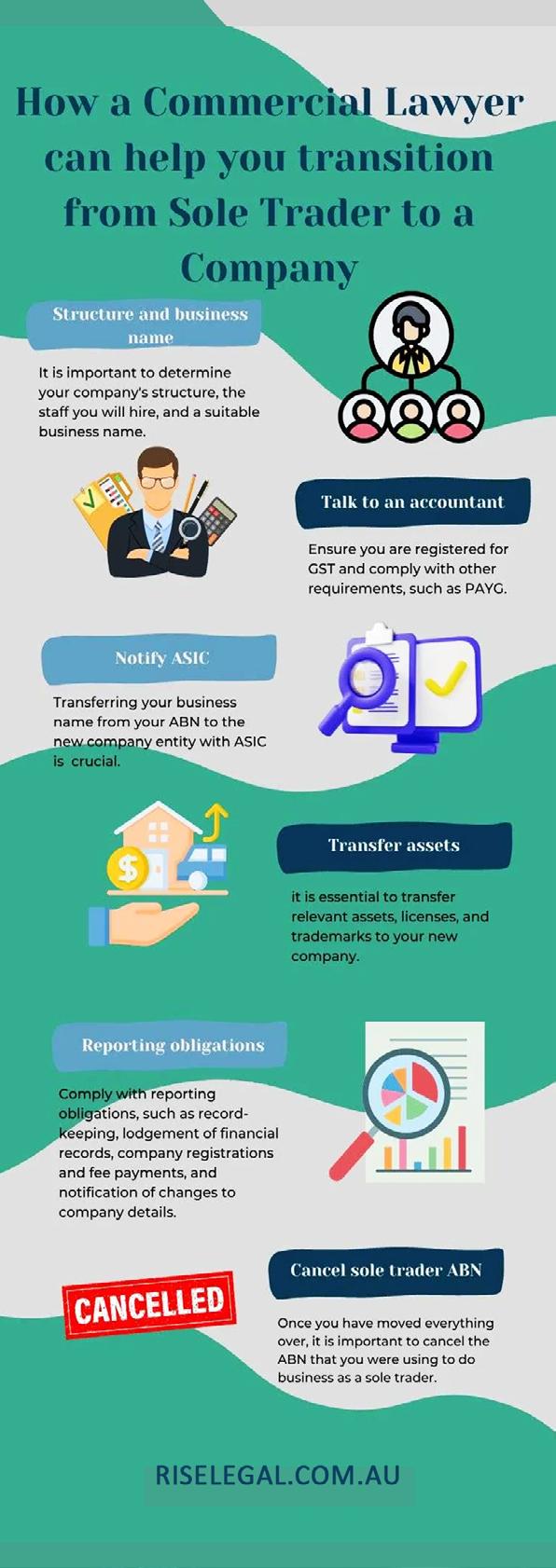
3 minute read
Transitioning from Sole Trader to Company How a Commercial Lawyer can assist.
Making the transition from a sole trader to a company is a significant decision that can bring numerous benefits, such as reduced personal obligations and the ability to attract investments. However, it is important to ensure that you follow the correct legal procedures when making this transition. In this blog, we will outline the steps involved in transitioning from a sole trader to a company and how a commercial lawyer can assist you in this process.
Transition from Sole Trader to a Company
Step 1: Determine Your Company’s Structure, Staff, and Business Name
Before making the transition to a company, it is important to determine your company’s structure, the staff you will hire, and a suitable business name. A commercial lawyer can help you to choose the right company structure, whether it be a proprietary company or another type of entity. They can also assist you in selecting a business name that complies with the Australian Securities and Investments Commission (ASIC) regulations.
Step 2: Consult With Your Accountant
It is important to consult with your accountant before making the transition to a company to ensure you are registered for GST and comply with other requirements, such as PAYG. A commercial lawyer can liaise with your accountant to ensure that all necessary requirements are met during the transition process.
Step 3: Transfer Your Business Name and Insure Your New Company
Transferring your business name from your ABN to the new company entity with ASIC is a crucial step in transitioning from a sole trader to a company. However, it is important to note that transferring the business name from a sole trader to a company does not automatically transfer the legal responsibilities of products sold previously under the former ABN structure. You will need to ensure that the new company is insured, and the old ABN has sufficient runoff cover for any liabilities.
Step 4: Transfer Other Relevant Assets and Licenses
Apart from transferring the business name, it is also essential to transfer other relevant assets, licenses, and trademarks to your new company. A commercial lawyer can assist you in ensuring that all transfers are conducted correctly and that the appropriate legal procedures are followed.
Step 5: Comply with Additional Reporting Obligations
As a company, you will have to comply with additional reporting obligations, such as record-keeping, lodgement of financial records, company registrations and fee payments, and notification of changes to company details, including updating ABN details on the Australian Business Register (ABR). A commercial lawyer can assist you in ensuring that you comply with all additional reporting obligations and that all relevant paperwork is filed correctly.
Step 6: Cancel the ABN Used for Your Sole Trader Business
Once you have moved everything over, it is important to cancel the ABN that you were using to do business as a sole trader. A commercial lawyer can assist you in cancelling your ABN and ensuring that all relevant documentation is filed correctly.
Why You Need A Commercial Lawyer
While it is possible to make the transition from a sole trader to a company independently, it is advisable to seek the assistance of a commercial lawyer to ensure that you comply with all legal requirements. A commercial lawyer can assist you in navigating the complexities of the transition process and ensuring that all necessary procedures are followed.
In addition, a commercial lawyer can help you to draft a shareholder agreement and other relevant documents to protect your interests as a shareholder in the new company if there is more than one owner. They can also provide advice on the legal implications of your shareholding and the rights and responsibilities of shareholders in the new company.
In summary, transitioning from a sole trader business to a company can offer a range of benefits, but it is important to follow the correct legal procedures to ensure a smooth transition. Seeking professional legal advice is highly recommended to avoid any potential issues or complications down the line. A commercial lawyer can assist with the legal aspects of the transition, including transferring business assets and licenses, ensuring compliance with reporting obligations, and drafting the necessary documents. It’s important to note that each business’s situation may be unique, and it may be beneficial to seek professional advice from a commercial lawyer or accountant to ensure that all legal and financial requirements are met. By working with a legal professional, you can rest assured that your transition to a company structure is in compliance with Australian laws and regulations.
To get further information as to how Rise Legal can assist you in transitioning from sole trader to company, book in for a free 15-minute consultation with one of our lawyers.











